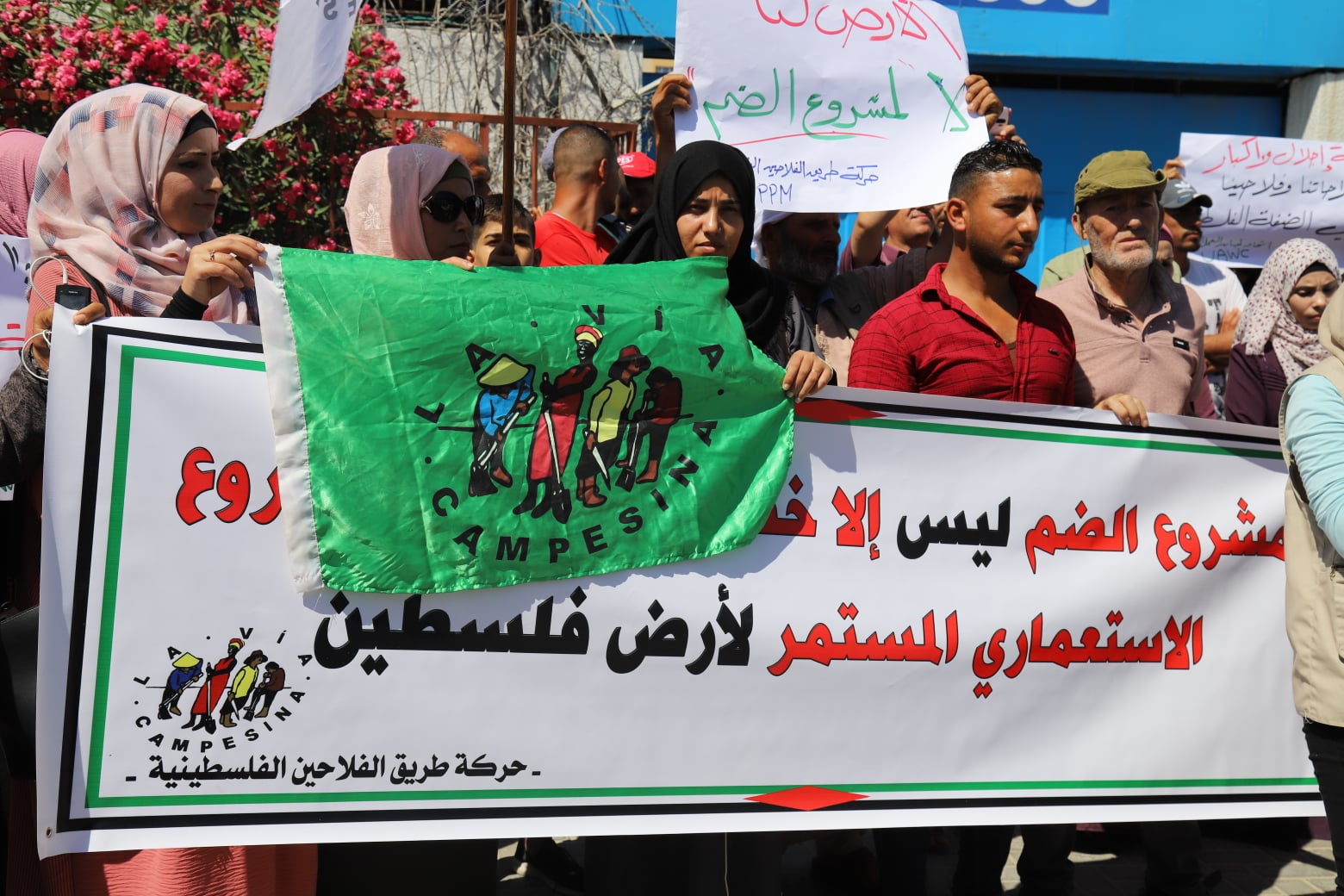La Via Campesina condemns the colonialist annexation plan in Palestine

“Peasants and other people working in rural areas have the right to be protected against arbitrary and unlawful displacement from their land or place of habitual residence, or from other natural resources used in their activities and necessary for the enjoyment of adequate living conditions…” – Article 17.4 of the U.N. Declaration on the Rights of Peasants and Other People Working in Rural Areas[1]
(Harare, July 2, 2020) Steadfast in our solidarity with all those who struggle for Food Sovereignty and the full realization of peasants’ rights, La Via Campesina expresses our unwavering support for the Palestinian people and peasant movement united against U.S.-backed Israeli attempts to annex the vital lands, waters, and territories of occupied Palestine’s Area C. On behalf of our 200 million members organized in 182 local and national organisations around the world, La Via Campesina adds our voice to global opposition[2] to Israel’s illegal annexation plans and reiterates our demand for an end to the entire Israeli occupation.
“In the Palestinian context, the issue of Food Sovereignty is of great importance, considering the Israeli military occupation that has full control over Palestinian natural resources, including land, water, pastures, and fisheries.” [3]
The Criminal Annexation of Palestine’s Breadbasket
Israel’s occupation of Palestine has included, since 1967, a system of control whereby natural resources are appropriated and exploited for the benefit of Israelis at the expense of Palestinian lives and livelihoods. It has created increasingly unlivable conditions for Palestinians in the occupied territories in order to force them to relocate and allow Israel to permanently annex lands, waters and territories. In the Jordan Valley, for example, unlivable conditions led to a significant drop of the Palestinian population over the past several decades – from 320,000 in 1967 to only 58,239 today[4]. According to the Palestinian Academic Society for the Study of International Affairs, the Jordan Valley “is the most fertile and resource-rich area of the West Bank, with key land reserves for natural expansion. It is known for its rich agricultural production, warm climate, abundant water resources, and also attracts tourism with over 80 historical and cultural sites”.
During July 2020, the Israeli government intends to push through an illegal annexation of 30% of the occupied West Bank and roughly 50% of Area C – Palestinian territory under full Israeli administrative and security control as per the Oslo Accords. Area A – administered exclusively by the Palestinian Authority – makes up only 18% of the West Bank while Area B – supposedly under Palestinian civil control and joint Israeli-Palestinian security control – makes up about 21% of the same area. Area C, meanwhile, includes over 61% of the West Bank, runs between both Areas A and B, and is under complete Israeli control, including security, planning, and zoning. As part of Oslo I and Oslo II, the entirety of Areas A, B, and C were supposed to be under the full governance of the Palestinian Authority before the year 2000 but respect for the Palestinian Right to Self Determination has not materialized, to say the least[5].
The Jordan Valley, as noted above, is considered the breadbasket of the future Palestinian state. It contains vital land and water resources for the natural expansion of Palestinian towns and cities and Palestinian agriculture industries. It has the richest water resources in the whole of the West Bank and is essential for the lives and livelihoods of most Palestinian farmers, their families and urban fellows. In short, Its annexation would gravely violate the rights of all Palestinians – especially its peasant farmers. Israel already controls most of the water resources in the area, causing Palestinians in the Jordan Valley, especially those in Area C, to suffer from water inaccessibility.[6] By blocking access to land, water and territory, Israel is attempting to consolidate its control over Palestinians’ food production and prevent any attempt towards self-sufficiency, Food Sovereignty, and disengagement with the occupation economy.
La Via Campesina stands in solidarity with our member organization in Palestine – the Union of Agricultural Work Committees (UAWC) – and calls on friends and allies alike to join us in denouncing the U.S.-backed Israeli Annexation Plan. We consider it an explicit violation of international law, including the UN Declaration on Peasants Rights, and point to its prevention of people from accessing their own natural resources such as land and water, producing their own food and choosing the most sustainable, resilient, productive, diverse, locally appropriate food system that suits them.
We call on the international community and all who struggle for human rights to:
– Take urgent and effective actions to reject the US proposition which is in violation of UN resolutions and stop Israeli plans of illegal annexations in Area C. The UN itself, together with the international community, must act immediately to halt Israel’s annexation plans, defend the rights of Palestinians, and uphold both international law and UN credibility;
– Take decisive action, including employing all available lawful countermeasures to uphold accountability in order to halt further annexation and severance of Palestinian territorial integrity and ensure rapid reversal of those measures announced or already implemented.
[1] https://undocs.org/en/A/RES/73/165
[3] https://viacampesina.org/en/declaration-of-the-international-conference-on-food-sovereignty-colony-and-frontiers/
[4] http://www.passia.org/maps/view/74
[5] Union of Agricultural Work Committees: “Reality of Area C: A human rights perspective”, 2019.
[6] Union of Agricultural Work Committees: “Factsheet 1- Current Status of Jordan Valley”, 2019.
